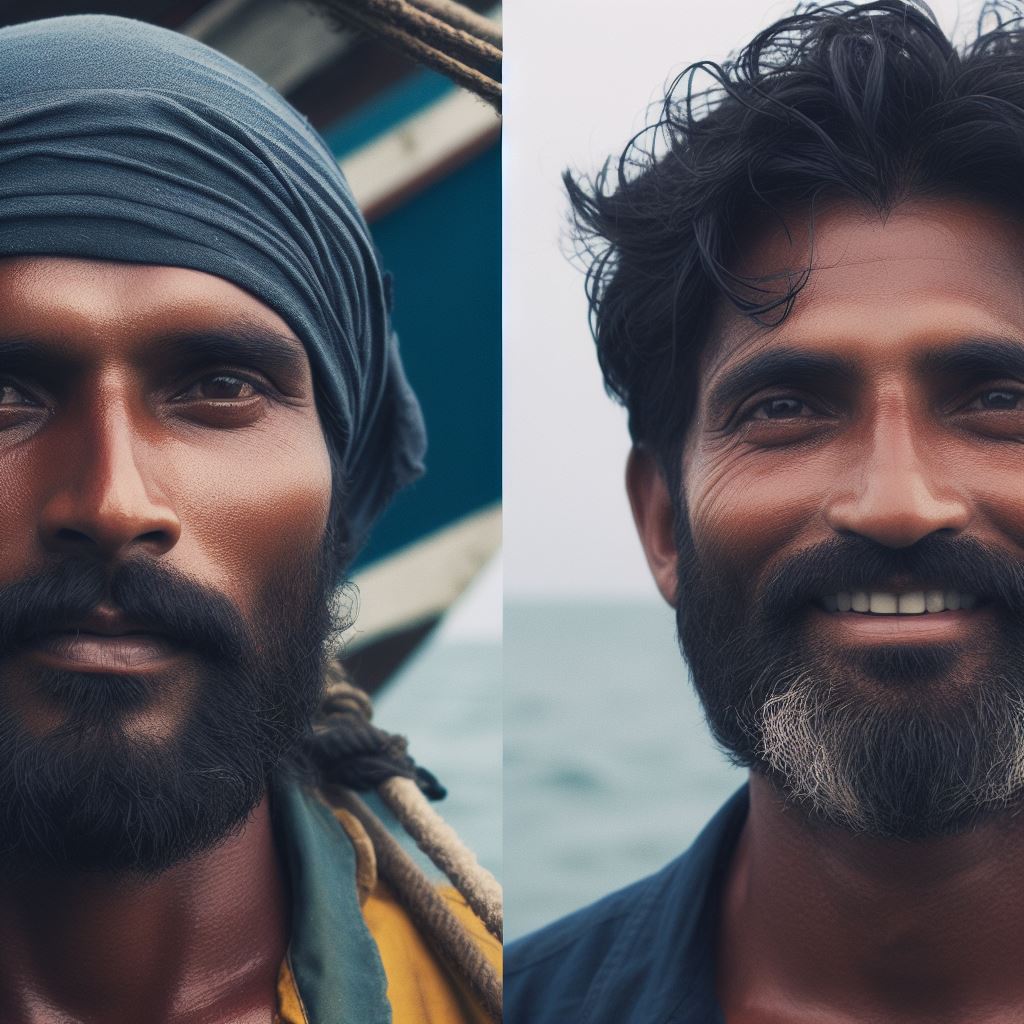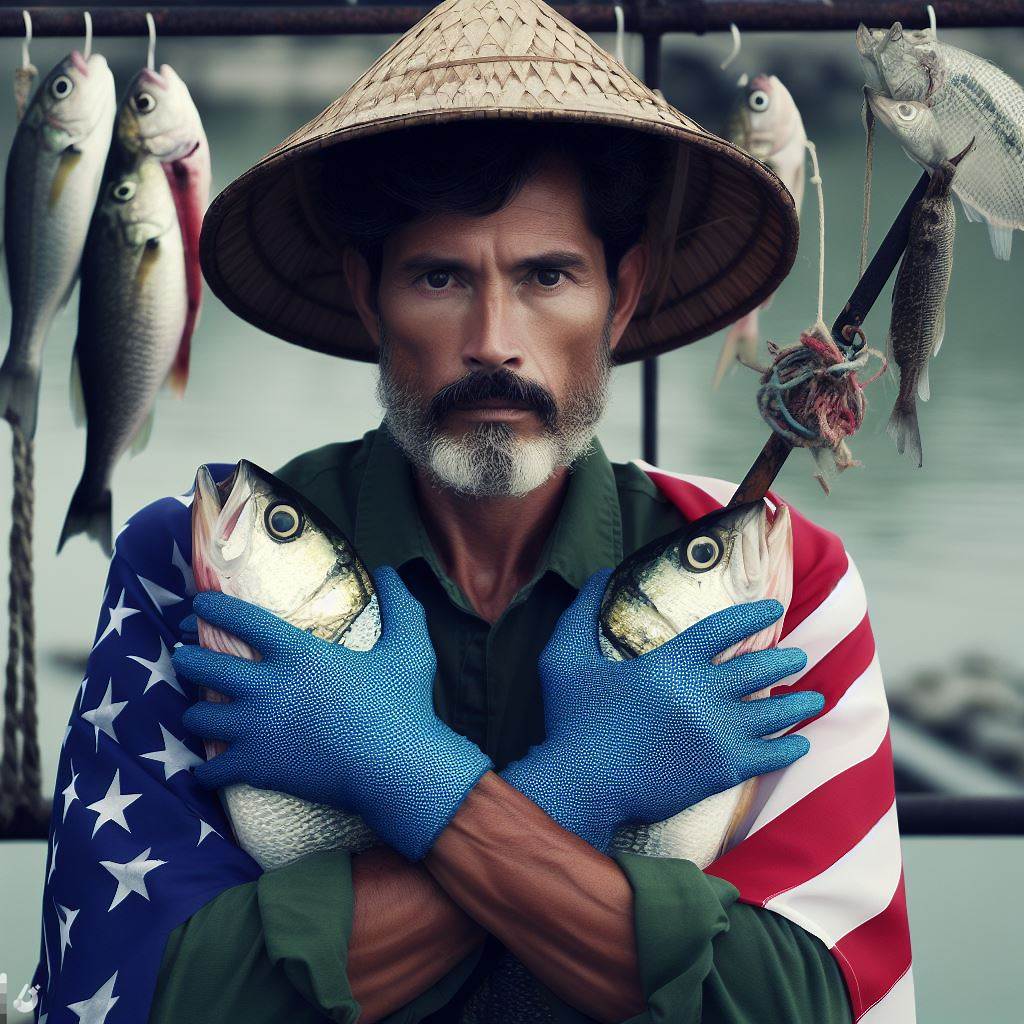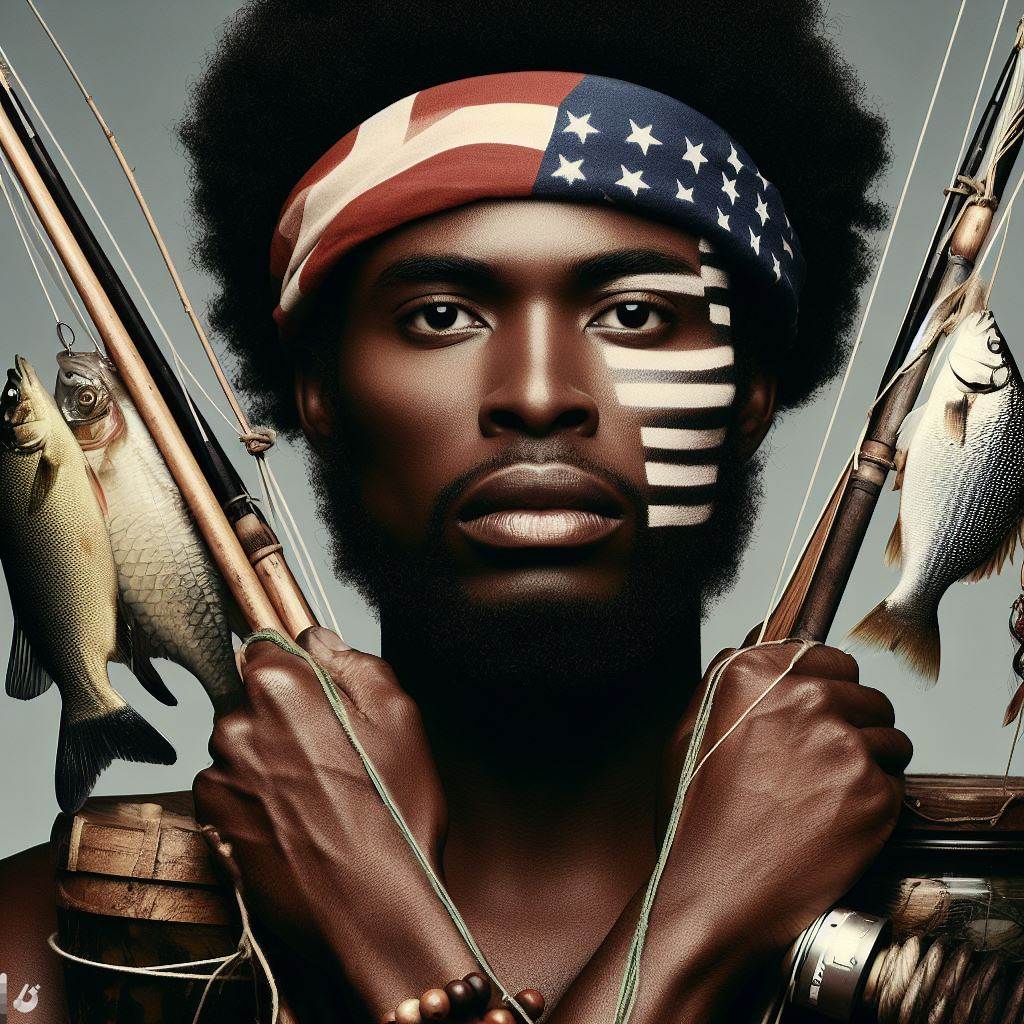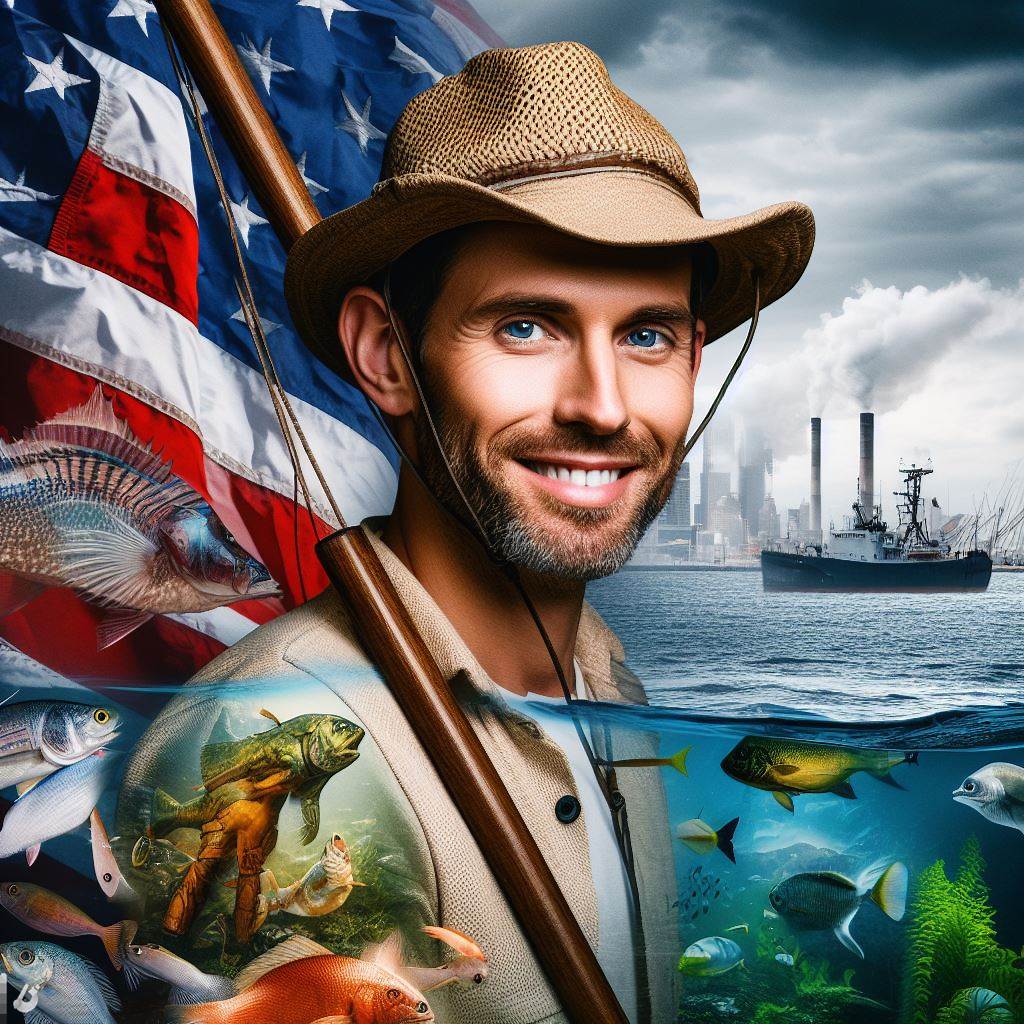Introduction
US fishermen play a crucial role in the economy and have intriguing stories.
US fishermen are unsung heroes of our economy, contributing significantly to food supply and employment.
Their stories are often overlooked yet encapsulate the bravery, resilience, and unique experiences found at sea.
In this blog Section, we delve into the captivating narratives of these unsung heroes, shedding light on the challenges they face and the triumphs they achieve.
The sea has always been a mysterious and unpredictable domain, calling upon men and women to venture out in pursuit of sustenance and livelihood.
Through their stories, we gain insight into the risks they undertake, battling harsh weather conditions, treacherous waters, and the ever-changing tides.
Amid the darkness of the vast ocean, these fishermen demonstrate unwavering determination as they cast their nets, bait their hooks, and set sail.
Each tale is a testament to their indomitable spirit and unyielding will to provide for their families and communities.
Beyond the demands of their profession, these individuals share a profound connection with the sea.
They witness mesmerizing sunsets on the horizon, encounter majestic marine creatures, and embrace a deep appreciation for nature’s wonders.
Their stories remind us of the importance of preserving our oceans, as they depend on its abundance for their livelihoods.
Throughout this blog section, we will hear firsthand accounts from US fishermen, exploring their unique experiences, triumphs, and struggles.
By delving into their tales, we gain a newfound respect for these courageous individuals who navigate the sea’s challenges and contribute to our society in profound ways.
Join us as we immerse ourselves in the captivating stories of US fishermen, honoring their dedication and resilience in the face of adversity.
Historical Context of US Fishing Industry
Brief history of fishing in the United States
- Fishing in the United States has a long and rich history, dating back to indigenous tribes.
- Early European settlers in North America greatly relied on fishing for sustenance and trade.
- The development of the fishing industry accelerated with the growth of fishing towns and cities.
- Important milestones include the establishment of the first fishing regulations and fishing companies.
- Over time, technological advancements, such as the invention of steam-powered vessels, revolutionized fishing methods.
Impact of fishing on the nation’s economy and culture
- Fishing has played a crucial role in shaping the economic and cultural landscape of the United States.
- The fishing industry has provided employment opportunities for coastal communities throughout history.
- Fishermen have contributed to the growth of seafood markets, both domestically and internationally.
- The fishing industry has stimulated the development of related sectors, including shipbuilding and processing.
- The cultural significance of fishing is reflected in art, literature, festivals, and the culinary traditions of the nation.
Significance of US fishermen in preserving fishing traditions
- US fishermen have played a vital role in preserving traditional fishing methods and techniques.
- They have inherited knowledge and skills passed down through generations, ensuring cultural continuity.
- By practicing sustainable fishing, US fishermen contribute to the preservation of marine ecosystems.
- Through their advocacy efforts, fishermen have influenced fishing policies, protecting their livelihoods and traditions.
- US fishermen’s commitment to preserving fishing traditions helps maintain the unique identity of coastal communities.
Fishing has been an integral part of the nation’s heritage, deeply intertwined with its economy and culture.
The history of fishing in the United States harks back to the time of indigenous tribes, who relied on fishing for sustenance and trade.
With the arrival of European settlers, fishing became even more prominent as a vital economic activity.
Fishing towns and cities emerged along the coastline, contributing to the growth of the industry.
Various milestones mark the development of the fishing industry in the US.
Fishing regulations and the formation of fishing companies ensure sustainable practices and facilitate trade.
Transform Your Career Today
Unlock a personalized career strategy that drives real results. Get tailored advice and a roadmap designed just for you.
Start NowTechnological advancements revolutionized fishing methods.
Fishing has a significant impact on the US economy and culture.
Coastal communities rely on the fishing industry for employment opportunities and economic stability.
The growth of seafood markets opens new avenues for trade.
The fishing industry stimulates related sectors, creating additional economic opportunities.
Fishing’s cultural significance is reflected in art, literature, festivals, and culinary traditions.
Fishermen preserve traditional fishing methods and pass down knowledge. Sustainable fishing practices preserve marine ecosystems.
Fishermen shape fishing policies and industry regulations. Their advocacy ensures the sustainability of the fishing industry.
They preserve the unique identity of coastal communities.
Read: Sustainable Fishing Practices: US Efforts and Achievements
Personal Story 1: Life on a Fishing Boat
Introduction to the first fisherman and their background
- Meet Mark, a seasoned fisherman with years of experience on the open seas.
- Born and raised in a small coastal town, he developed a deep love for fishing at a young age.
- His father taught him the trade, passing down generations of knowledge and skills.
- With weathered hands and a weathered heart, Mark has dedicated his life to the sea.
Description of the daily routine and challenges faced on the fishing boat
- Each day starts before the crack of dawn, as Mark and his crew set sail.
- Their heavy-duty fishing boat is their gateway to the vast ocean, filled with uncertainty and bounty.
- The relentless waves crash against the boat, testing its strength and the will of the fishermen.
- Long hours are spent hauling fishing nets, battling fatigue and unpredictable weather conditions.
- Scorching sun, bone-chilling winds, and relentless storms are just part of their daily reality.
- The physical demands are immense, but the camaraderie among the crew keeps them going strong.
Highlights of memorable experiences or encounters while at sea
- One unforgettable moment was when they came across a pod of dolphins, gracefully leaping alongside the boat.
- The sight of these majestic creatures brought joy and a sense of wonder to their tired souls.
- There was also the time a massive whale emerged from the depths, leaving everyone in awe.
- Mark will forever cherish the memory of that majestic creature, its beauty etched in his mind.
- However, not all encounters were pleasant. One stormy night, their boat got caught in treacherous waters.
- Waves crashed against the vessel, threatening to swallow it whole, testing their resolve to the core.
Life on a fishing boat is undoubtedly challenging, but for Mark and other fishermen like him, it’s a way of life.
The long hours, hard work, and unpredictable nature of the sea create a unique bond among these individuals.
They face danger and adversity together, relying on their experience, knowledge, and each other to survive.
Through their personal stories, fishermen like Mark bring to light the hardships and triumphs of life on the sea.
It’s a life filled with sacrifice, but for those who are called to it, every moment is an adventure worth living.

Personal Story 2: Adventures and Dangers at Sea
Introduction to the second fisherman and their experiences
Meet Jake, a seasoned fisherman with a lifetime of adventures on the open sea. His stories will leave you in awe.
Jake has been fishing since he was a young boy, learning the ropes from his father and grandfather.
His love for the sea grew with each passing year, as did his desire to explore the unknown.
Narration of exciting and adventurous moments during fishing trips
One memorable fishing trip was when Jake encountered a massive school of tuna, creating a spectacle like no other.
With adrenaline pumping through his veins, he cast his net, hauling in an unimaginable amount of fish.
Transform Your Career Today
Unlock a personalized career strategy that drives real results. Get tailored advice and a roadmap designed just for you.
Start NowAnother unforgettable moment was when Jake came face to face with a humpback whale, its sheer size and beauty leaving him breathless.
He recalls the excitement of watching the gentle giant breach, as if it was putting on a show just for him.
Discussion of the dangers faced by fishermen such as storms and accidents
However, Jake knows that every adventure comes with its fair share of dangers.
Storms can appear out of nowhere, turning calm waters into a raging tempest, testing both skills and courage.
As waves pounded against the boat, Jake and his crew had to navigate through treacherous conditions, praying for their safe return.
Accidents are also a constant threat for fishermen. Jake vividly remembers a close encounter with a massive swordfish.
While trying to reel it in, the swordfish thrashed violently, almost impaling him with its long, sharp bill.
These perilous moments at sea serve as a reminder of the risks fishermen take each time they set sail.
Most Importantly, Jake’s personal stories of adventure and danger at sea offer a glimpse into the unpredictable life of a fisherman.
From encountering magnificent creatures to braving treacherous storms, each experience shapes their character and fuels their passion.
So the next time you enjoy a fresh catch, remember the tales of those brave men and women who risk their lives to bring food to our tables.
Read: The Most Popular Fishing Regions in the US Explored
Personal Story 3: Environmental Impact and Conservation Efforts
Introduction to the third fisherman and their perspective on the environment
Meet Mark, a seasoned fisherman with a deep appreciation for our oceans and its fragile ecosystem.
Explanation of the impact of overfishing and climate change on the fishing industry
Mark shares his concern about how overfishing and climate change have devastated the fishing industry.
He highlights the decline in fish populations, forcing fishermen to go further out to sea to catch fish.
He discusses the warming of waters, disrupting migratory patterns and affecting fish habitats.
These combined factors have led to the collapse of fishing communities and decreased livelihoods.
Description of the fisherman’s involvement in conservation initiatives
Mark actively participates in conservation initiatives to make a difference.
He educates fellow fishermen about sustainable practices, including size and catch limits.
Mark promotes the use of fishing gear that reduces bycatch and harm to marine life.
Transform Your Career Today
Unlock a personalized career strategy that drives real results. Get tailored advice and a roadmap designed just for you.
Start NowHe volunteers with local organizations to clean beaches and raise awareness about pollution.
Mark believes that fishermen must understand their actions’ environmental impact.
By collaborating with scientists and conservationists, they can achieve sustainable fishing.
Mark’s experiences highlight the importance of protecting the ocean for future generations.
Overfishing and climate change have significantly impacted the fishing industry.
Mark explains how fish populations have dwindled, causing economic hardship for fishermen.
Overfishing and climate change have left fishing communities struggling.
Mark actively engages in conservation initiatives to combat these issues.
He educates fellow fishermen about sustainable practices.
He encourages size and catch limits to allow fish populations to recover.
Mark promotes fishing gear that minimizes bycatch through harm reduction.
His advocacy extends to volunteering to clean beaches and raise awareness about pollution.
Mark understands the importance of collaboration between fishermen, scientists, and organizations.
By working together, they can restore fish populations and protect marine ecosystems.
Mark hopes his involvement will inspire other fishermen to prioritize conservation.
Mark’s personal story highlights the environmental impact of overfishing and climate change.
Through his active involvement in conservation initiatives, he is a role model for fellow fishermen.
Mark’s dedication to sustainable practices and protecting the ocean demonstrates that change is possible. His story reminds us that we all have a part to play in preserving our seas for future generations.
Read: Technological Advancements in US Fishing Industry
Personal Story 4: Passing Down the Tradition
Introduction to the fourth fisherman and their family legacy
In this section, we dive into the personal story of John Davis, a fourth-generation fisherman who comes from a long line of fishing enthusiasts.
Transform Your Career Today
Unlock a personalized career strategy that drives real results. Get tailored advice and a roadmap designed just for you.
Start NowGrowing up in a small coastal town, fishing has always been an integral part of John’s family tradition.
Passed down from his great-grandfather to his father and now to him, this legacy holds deep meaning for John and his family.
Discussion of teaching fishing skills and knowledge to future generations
John is proud to carry on the family tradition and is determined to pass down his fishing skills and knowledge to his own children.
From an early age, he started bringing his son, Ethan, on his fishing trips.
As they spent time on the boat together, John patiently taught Ethan how to cast the net, identify different fish species, and handle the equipment with care.
These valuable lessons not only built their bond but also ensured that the fishing tradition would continue in the future.
Reflection on the importance of preserving fishing traditions
Preserving fishing traditions is vital for many reasons.
Firstly, it serves as a link to our cultural heritage, connecting us to our ancestors who relied on fishing for survival.
Through these traditions, we gain a deeper understanding of our roots and the challenges faced by previous generations.
Passing down fishing knowledge ensures the sustainability of this industry and promotes responsible fishing practices.
By teaching future generations about conservation efforts and the importance of respecting marine life, we can preserve the delicate balance of our oceans.
For John, fishing is not just a means of livelihood; it is a way of life. It is a tradition that has shaped his identity, instilled in him a strong work ethic, and taught him the value of patience, resilience, and respect for nature.
He believes that by passing down these traditions to his children, he is not only carrying on his family’s legacy but also equipping them with valuable life skills.
As John reflects on his journey as a fisherman and a father, he realizes that the tradition of fishing is not confined to the act itself.
It encompasses the values, stories, and memories that are woven into the fabric of his family’s history.
It is a reminder of the sacrifices made by his ancestors and the perseverance required to thrive in a challenging industry.
Through his own experiences, he hopes to inspire future generations to embrace their roots, celebrate their heritage, and continue the legacy of fishing with pride and reverence.
Read: Challenges Faced by Modern-Day Fishermen in America
Conclusion
To recap, US fishermen and their personal stories are of great significance to our society.
Understanding and appreciating their experiences is crucial for valuing their contributions.
Transform Your Career Today
Unlock a personalized career strategy that drives real results. Get tailored advice and a roadmap designed just for you.
Start NowI urge readers to support and learn more about the US fishing industry through action and education.
In the vast expanse of the ocean, US fishermen navigate not just the waves but a tapestry of personal narratives.
Battling tempests and triumphing in calms, these seafarers embody resilience.
Amidst the rhythmic hum of the boat engines, stories of perseverance echo.
A salty camaraderie bonds these men of the sea, each tale a testament to the indomitable spirit that propels them forward.
From dawn’s first light to the twilight on the horizon, these narratives are woven into the very fabric of maritime life.
Beyond the crests and troughs, the tales of US fishermen narrate a legacy of dedication.
Their hands, weathered by wind and salt, tell tales of toil, determination, and a connection to the deep blue.
In these stories, we find not just livelihoods but a profound reverence for the oceans.
It’s a saga where the line between struggle and triumph is as fine as the fishing nets cast into the abyss.
As the last section of these maritime chronicles unfolds, we are left with a resounding echo of the sea’s unpredictable melody.
The sea, in all its majesty, becomes a backdrop to the unwritten stories that ripple through generations of fishermen.
These personal narratives, etched in the annals of maritime history, beckon us to listen, learn, and appreciate the relentless spirit of those who brave the open waters.
The tales from the sea, told in the voices of these fishermen, resonate as enduring sagas of courage on the vast canvas of the oceanic horizon.




